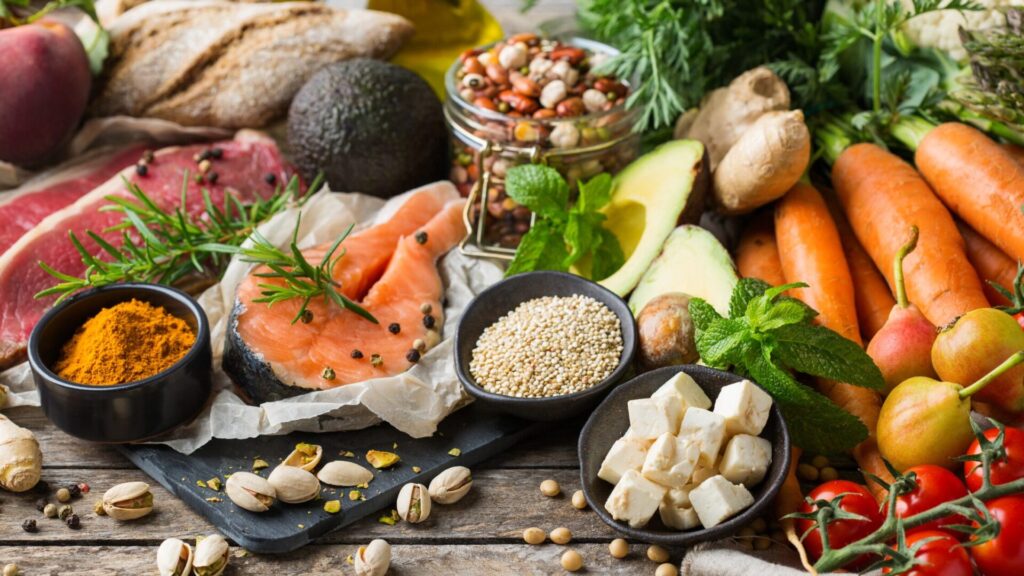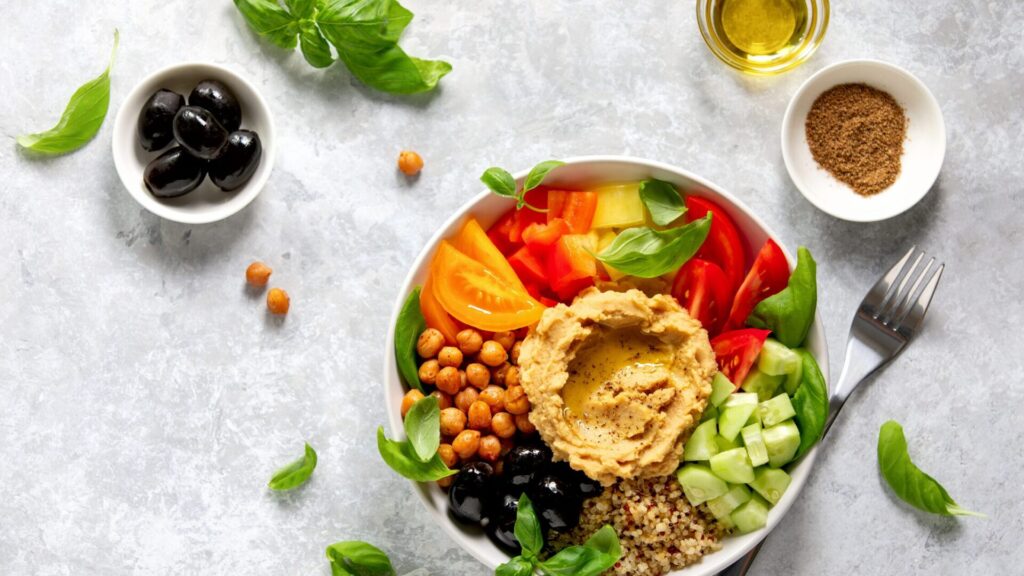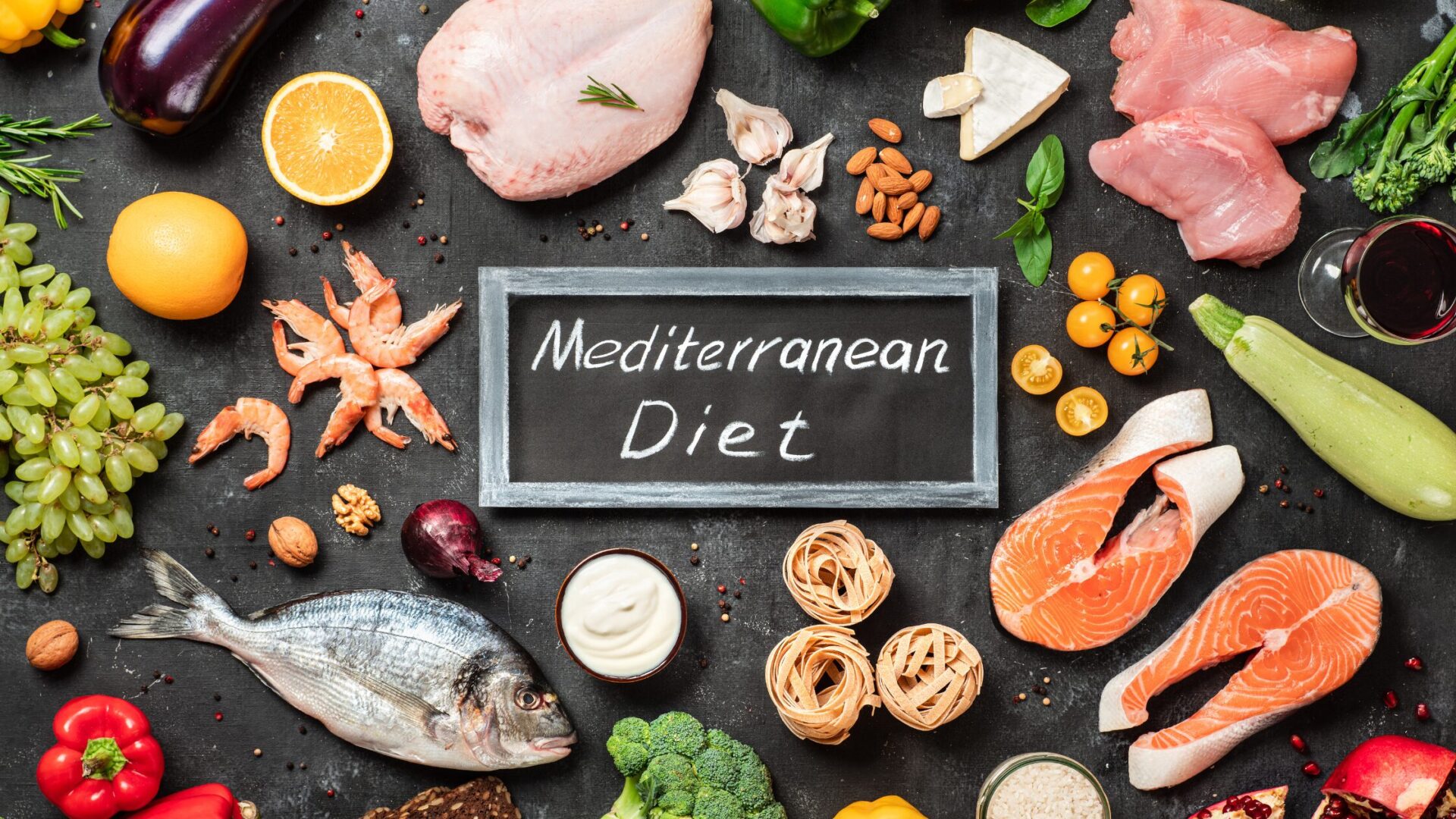What are the main foods in a Mediterranean diet?
Introduction
The Mediterranean diet, often recognized as one of the healthiest diets globally, is a culinary tradition primarily characterized by its focus on plant-based foods, healthy fats, lean proteins, and vibrant flavors.
Brief Overview of the Mediterranean Diet
The Mediterranean diet finds its roots in the olive tree-rich regions surrounding the Mediterranean Sea, specifically countries like Italy, Greece, and Spain. These geographies and their diverse cultures have significantly influenced the diet’s composition, making it an emblem of their culinary heritage. It is much more than just a dietary pattern, representing the lifestyle, cultural expression, and traditional practices of the Mediterranean people. From a nutritional perspective, the Mediterranean diet is revered for its potential health benefits, including reducing the risk of heart disease and promoting longevity.
Aim of the Article
This article aims to delve into the iconic foods that define the Mediterranean diet:
- Olive oil: Known for its heart-healthy fats and antioxidants, olive oil is a staple in almost every Mediterranean recipe.
- Fruits and Vegetables: The diet emphasizes the intake of a variety of fresh fruits and vegetables, rich in vitamins, minerals, and fiber.
- Whole Grains: These provide essential nutrients and help in maintaining a healthy digestive system.
- Seafood: Fish and shellfish, rich in Omega-3 fatty acids, are regularly consumed in this diet.
- Legumes and Nuts: A great source of protein and healthy fats, they are often used in salads, soups, and spreads.
- Herbs and Spices: Contributing to the vibrant flavors of Mediterranean cuisine, these also possess numerous health benefits.
Through an in-depth exploration of these foods, readers will gain a comprehensive understanding of the Mediterranean diet’s core components, enabling them to incorporate these elements into their eating habits effectively.
Historical and Cultural Background

The Mediterranean diet originated in the countries surrounding the Mediterranean Sea, primarily Italy, Greece, and Spain. These societies treasured food not just as a means of sustenance but as a fundamental part of their cultural and social fabric. Communal meals, market visits, and food preparations were interwoven with everyday life, symbolizing unity, hospitality, and tradition.
In these regions, the Mediterranean diet evolved over centuries, shaped by factors such as climate, geography, and socio-economic conditions. For instance, the abundance of olive trees in these regions led to the prominence of olive oil in their cuisine. Similarly, their coastal locations influenced the diet’s high seafood content.
Over time, the diet’s health benefits, coupled with its flavorful and diverse dishes, garnered global recognition. Today, the Mediterranean diet is celebrated worldwide, appreciated for its nutritional value and its representation of the vibrant Mediterranean lifestyle that emphasizes balance, variety, and the enjoyment of food. UNESCO even recognized the Mediterranean diet as an Intangible Cultural Heritage of Humanity in 2010, underscoring its significant global cultural and historical value.
Core Components of the Mediterranean Diet: Detailed Examination

Fruits and Vegetables
Integral to the Mediterranean diet, fruits and vegetables are consumed in abundance. Their significance lies not only in their nutritional value but also in the variety they bring to every meal. Here’s what makes fruits and vegetables an essential part of this diet:
- Variety: The Mediterranean diet does not limit itself to a specific set of fruits or vegetables, thereby bringing an array of colors and nutrients to the plate. From tomatoes, eggplants, and zucchinis to oranges, grapes, and figs, the diet encourages a broad spectrum of these food groups.
- Seasonality: Another unique aspect of the diet is the emphasis on seasonality. Consuming fruits and vegetables in their respective seasons ensures optimum flavor and nutritional value. Seasonal produce also reflects the Mediterranean tradition of using fresh ingredients.
- Freshness: The Mediterranean diet values freshness, often favoring raw or minimally processed fruits and vegetables to preserve their nutrients. Whether it’s a fresh salad or a fruit dessert, these foods are enjoyed in their most natural state.
Whole Grains
- Whole grains are a vital part of the Mediterranean diet, contributing significantly to its nutritional profile.
- These grains are high in fiber, promoting satiety, improving digestion, and reducing the risk of heart disease.
- Unlike refined grains, whole grains retain all parts of the grain – the bran, germ, and endosperm.
- Foods made from whole grains are rich in essential nutrients such as fiber, B vitamins, and iron.
- Examples of whole grains include whole wheat, barley, oats, bulgur, rye, and brown rice.
- Whole grains are commonly used in the Mediterranean diet in various forms – bread, pasta, couscous, and more.
- Consuming whole grains helps sustain energy levels throughout the day and supports overall health.
Healthy Fats
- The Mediterranean diet is renowned for its emphasis on healthy fats, particularly olive oil.
- Olive oil is a fundamental ingredient in Mediterranean cuisine, used for cooking, salad dressings, sautés, and dipping.
- It’s packed with heart-healthy monounsaturated fats and antioxidants with anti-inflammatory effects.
- Nuts and seeds like almonds, walnuts, and flaxseeds are also prominent in the diet.
- They provide healthy fats, fiber, and protein, helping to lower bad cholesterol levels and reduce the risk of heart disease and stroke.
- Despite being high in fat and calories, they are highly nutritious and can be enjoyed in moderation.
Fish and Seafood
Fish and seafood are integral components of the Mediterranean diet, offering high-quality protein and a rich source of omega-3 fatty acids.
- Variety: The Mediterranean diet encompasses a wide variety of fish and shellfish. Salmon, mackerel, tuna, and sardines are commonly consumed thanks to their high omega-3 content. Shellfish options include shrimp, clams, and mussels, among others.
- Frequency: It is recommended that fish or seafood be incorporated into meals at least twice a week.
- Preparation Methods: Mediterranean cuisine tends to favor simple preparation methods that preserve the integrity and nutritional value of fish and seafood. Grilling and baking are the preferred cooking methods, often with a drizzle of olive oil, a squeeze of fresh lemon, and a sprinkling of herbs for added flavor. Fish may also be stewed in a tomato-based sauce or incorporated into soups. Simplicity and freshness are key – allowing the natural flavors of the fish and seafood to shine.
Poultry and Eggs
Poultry and eggs are also part of the Mediterranean diet, offering good-quality protein and various essential nutrients.
- Poultry: Chicken and turkey are the most commonly consumed poultry. They are a lean source of protein and can be prepared in various ways – grilled, roasted, or poached. Poultry skin is usually removed to reduce the intake of saturated fats.
- Eggs: Eggs are a versatile food in the Mediterranean diet. They are high in protein and contain important nutrients like vitamins B2, B12, and D, as well as choline and selenium. They can be prepared in numerous ways (boiled, poached, scrambled, or as an omelet) and can be a part of breakfast, lunch, or dinner.
Dairy Products
Dairy products form a part of the Mediterranean diet, primarily consumed in the form of cheese and yogurt.
- Cheese: Cheese is a source of calcium and protein. Feta and mozzarella, traditional Mediterranean cheeses, are often used in salads, sandwiches, and various dishes.
- Yogurt: Yogurt, particularly the plain and unsweetened type, is a staple in Mediterranean cuisine. It’s a good source of protein and probiotics, which are beneficial for gut health. It can be used in both sweet and savory preparations.
Red Meat
While the Mediterranean diet focuses primarily on lean proteins, red meat is consumed but in moderation.
- Frequency: Red meat (like beef, pork, and lamb) is usually eaten only a few times a month, and portion sizes are kept small.
- Preparation: Red meat is typically grilled, broiled, or baked. It’s often used as a flavor enhancer in dishes rather than being the main component of a meal.
Health Benefits

The Mediterranean diet has long been applauded for its numerous health benefits, many of which are supported by scientific research. Here’s a closer look at a few of these benefits:
Cardiovascular Health
- The Mediterranean diet, high in fiber, healthy fats, and antioxidants, is associated with improved heart health. Studies suggest that it can lower the risk of heart disease, hypertension, and stroke by reducing levels of low-density lipoprotein (LDL), also known as ‘bad’ cholesterol, and increasing high-density lipoprotein (HDL), or ‘good’ cholesterol.
Weight Management
- This diet promotes whole, minimally processed foods with high satiety value, which can aid in weight management. Research shows that individuals following the Mediterranean diet have a lower tendency to gain weight and are less likely to be overweight or obese.
Diabetes Control
- Rich in fiber and low in refined carbs, the Mediterranean diet can help regulate blood sugar levels and improve insulin sensitivity, which is beneficial for individuals with type 2 diabetes or those at risk.
Mental Health
- Recent research has indicated a positive link between the Mediterranean diet and mental health. The diet’s high omega-3 content and diverse range of antioxidants can help improve brain function and potentially reduce the risk of neurodegenerative diseases like Alzheimer’s and dementia.
Longevity
- The Mediterranean diet is often associated with longevity. The high consumption of fruits, vegetables, whole grains, and healthy fats, combined with moderate wine consumption, can contribute to a longer life span. The diet’s focus on balance, diversity, and quality of ingredients may also play a role in promoting a longer, healthier life.
Impact on Heart Health, Weight Management, and Chronic Disease Prevention
The Mediterranean diet has a profound effect on overall health, particularly in areas such as heart health, weight management, and chronic disease prevention.
Heart Health
An abundance of heart-healthy monounsaturated fats, particularly from olive oil and nuts, feature prominently in the Mediterranean diet. These fats help lower levels of LDL cholesterol and increase levels of HDL cholesterol, reducing the risk of cardiovascular disease. The inclusion of fish, rich in omega-3 fatty acids, further aids heart health by reducing inflammation and lowering blood pressure.
Weight Management
With a focus on whole, unprocessed foods, the Mediterranean diet supports healthy weight management. High-fiber foods, like fruits, vegetables, and whole grains, contribute to feelings of fullness and help regulate the digestive system. The diet discourages the consumption of refined carbohydrates and sugars, which can lead to weight gain and metabolic problems.
Chronic Disease Prevention
The Mediterranean diet is associated with a lower risk of developing chronic diseases such as diabetes and cancer. High in dietary fiber and low in refined carbohydrates, the diet helps regulate blood sugar levels, reducing the risk of type 2 diabetes. Antioxidant-rich fruits and vegetables, along with healthy fats, help protect against various types of cancer. Furthermore, the omega-3 fatty acids and antioxidants found in the diet may protect against neurodegenerative diseases, such as Alzheimer’s and dementia.
Mediterranean Diet in Daily Life

Adopting the Mediterranean diet into daily life doesn’t require drastic changes. It’s more about making healthier choices and emphasizing fresh, natural ingredients over processed foods.
Practical Tips for Incorporating Mediterranean Foods into Everyday Meals
- Variety of Vegetables: Incorporate a variety of colorful vegetables into your meals. It could be a green salad for lunch or grilled veggies for dinner.
- Fruits as Dessert: Use fresh fruits as your go-to dessert. Berries, oranges, or a handful of grapes can satisfy your sweet tooth and provide essential nutrients.
- Whole Grains: Switch to whole grains. Instead of regular pasta or white rice, opt for whole-grain alternatives.
- Healthy Fats: Cook with olive oil instead of butter. Snack on a handful of nuts or seeds instead of chips or cookies.
- Lean Proteins: Choose lean proteins like poultry or fish. Try to limit red meat to a few times a month.
- Herbs and Spices: Flavor your dishes with herbs and spices instead of salt. This not only enhances taste but also increases your antioxidant intake.
- Moderate Dairy: Incorporate moderate amounts of cheese and yogurt into your meals. Choose low-fat or non-fat options when possible.
- Limit Processed Foods: The Mediterranean diet emphasizes whole foods. Try to limit your intake of processed foods, which are often high in sodium and added sugars.
- Stay Active: Besides diet, maintaining an active lifestyle is an integral part of Mediterranean living. Regular physical activity promotes heart health and helps with weight management.
Simple Mediterranean Recipes for Beginners
Starting with the Mediterranean diet can be exciting and enriching, especially when you begin experimenting with its colorful and diverse range of ingredients. Here are a few easy recipes to help you get started:
Mediterranean Salad
- Ingredients: Mixed greens, cherry tomatoes, cucumbers, olives, feta cheese, olive oil, lemon juice, salt, and pepper.
- Instructions: Combine all the ingredients in a large bowl. Drizzle olive oil and lemon juice over the top. Season with salt and pepper.
Grilled Fish with Lemon and Herbs
- Ingredients: White fish fillets, olive oil, lemon, fresh herbs (like parsley or dill), salt, and pepper.
- Instructions: Marinate the fish in olive oil, lemon juice, herbs, salt, and pepper. Grill until cooked through.
Quinoa Tabbouleh
- Ingredients: Cooked quinoa, tomatoes, cucumbers, fresh parsley, mint, olive oil, lemon juice, salt, and pepper.
- Instructions: Mix all ingredients together in a bowl. Adjust seasoning to taste.
Gradual Dietary Changes for Beginners
Transitioning to the Mediterranean diet doesn’t have to be overwhelming. Here are some practical tips for making gradual changes:
- Start Small: Begin by adding more fruits and vegetables to your meals. Gradually increase the amount and variety as you get comfortable.
- Swap Out Red Meat: Try replacing red meat with fish or poultry. If going completely meatless feels challenging, try it one day a week and gradually increase.
- Incorporate Whole Grains: Replace refined grains like white rice and regular pasta with whole grain alternatives. This could be as simple as switching your morning cereal to oatmeal.
- Use Healthy Fats: Start using olive oil instead of butter or other cooking oils. Include a handful of nuts or seeds in your daily diet.
- Limit Processed Foods: Begin by cutting down on one processed food item at a time. Replace them with whole foods wherever possible.
- Stay Active: Incorporate some form of physical activity into your routine. It could be as simple as a daily walk or a few minutes of stretching.
Remember, the key is to make gradual and sustainable changes. It’s not about perfection but progress. With time, these small changes can add up to a significant impact on your health and well-being.
Sustainability and Environmental Impact of the Mediterranean Diet
The Mediterranean diet isn’t just beneficial for our health, it’s also aligned with sustainable eating practices. Emphasizing locally sourced, seasonal produce, the diet promotes biodiversity and supports local farming communities. Consuming local, in-season produce not only ensures the highest nutritional value but also reduces the environmental impact of long-distance transportation and storage.
Furthermore, the Mediterranean diet’s emphasis on plant-based foods and limited intake of red meat aligns well with environmentally friendly food production. Livestock farming, particularly cattle, are a major contributor to greenhouse gas emissions. Therefore, a dietary pattern that lessens reliance on red meat aids in mitigating the impacts of climate change.
Also, the Mediterranean diet values quality over quantity. It encourages moderate consumption of food, which aids in reducing food waste, a significant issue in many parts of the world.
By promoting these sustainable practices, the Mediterranean diet not only makes a positive impact on our personal health but also contributes to the health of our planet and the vitality of local economies.
Conclusion
In conclusion, the Mediterranean diet features a multitude of wholesome foods like vibrant vegetables, fresh fruits, hearty whole grains, lean proteins, and healthy fats. It encourages a flavorful and nutritional symphony of herbs and spices and moderates the consumption of dairy products. Packaged, processed foods find a minimal place in this dietary pattern, reinforcing its health benefits. Some key cultural aspects of the diet include eating seasonally and locally, which not only supports local farming communities but also lessens the environmental impact of our food choices. With its emphasis on quality and moderation, the Mediterranean diet counters the culture of overeating, further reducing food waste. It takes a holistic approach to health, intertwining physical activity into its philosophy. The Mediterranean diet, apart from being an enriching culinary journey, serves as a sustainable and health-promoting lifestyle choice. As you embark on this dietary exploration, you’re sure to discover a world of flavors, all while doing your part for your health and the environment. Explore, enjoy, and enrich your life with the Mediterranean diet.



